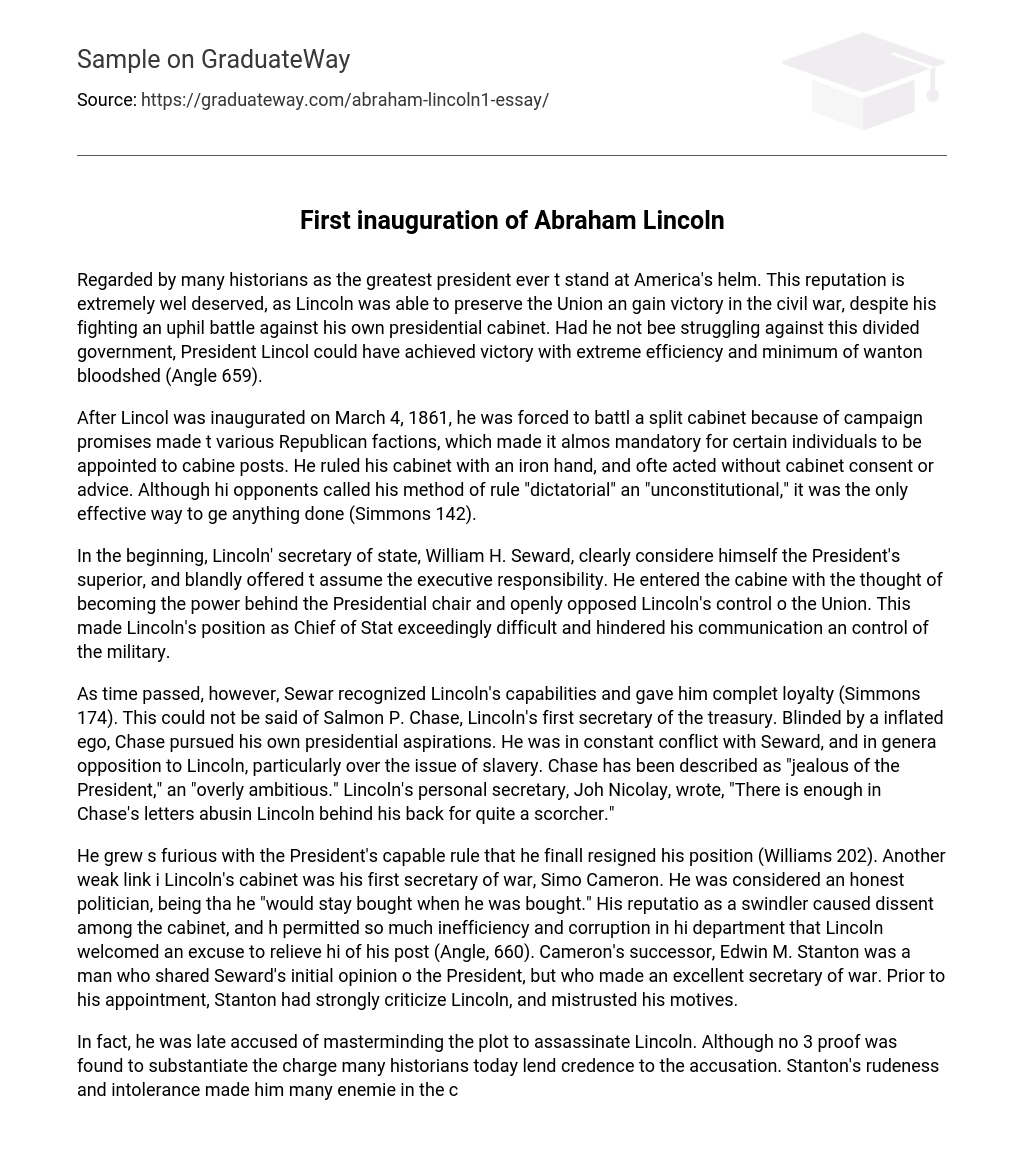Regarded by many historians as the greatest president ever t stand at America’s helm. This reputation is extremely wel deserved, as Lincoln was able to preserve the Union an gain victory in the civil war, despite his fighting an uphil battle against his own presidential cabinet. Had he not bee struggling against this divided government, President Lincol could have achieved victory with extreme efficiency and minimum of wanton bloodshed (Angle 659).
After Lincol was inaugurated on March 4, 1861, he was forced to battl a split cabinet because of campaign promises made t various Republican factions, which made it almos mandatory for certain individuals to be appointed to cabine posts. He ruled his cabinet with an iron hand, and ofte acted without cabinet consent or advice. Although hi opponents called his method of rule “dictatorial” an “unconstitutional,” it was the only effective way to ge anything done (Simmons 142).
In the beginning, Lincoln’ secretary of state, William H. Seward, clearly considere himself the President’s superior, and blandly offered t assume the executive responsibility. He entered the cabine with the thought of becoming the power behind the Presidential chair and openly opposed Lincoln’s control o the Union. This made Lincoln’s position as Chief of Stat exceedingly difficult and hindered his communication an control of the military.
As time passed, however, Sewar recognized Lincoln’s capabilities and gave him complet loyalty (Simmons 174). This could not be said of Salmon P. Chase, Lincoln’s first secretary of the treasury. Blinded by a inflated ego, Chase pursued his own presidential aspirations. He was in constant conflict with Seward, and in genera opposition to Lincoln, particularly over the issue of slavery. Chase has been described as “jealous of the President,” an “overly ambitious.” Lincoln’s personal secretary, Joh Nicolay, wrote, “There is enough in Chase’s letters abusin Lincoln behind his back for quite a scorcher.”
He grew s furious with the President’s capable rule that he finall resigned his position (Williams 202). Another weak link i Lincoln’s cabinet was his first secretary of war, Simo Cameron. He was considered an honest politician, being tha he “would stay bought when he was bought.” His reputatio as a swindler caused dissent among the cabinet, and h permitted so much inefficiency and corruption in hi department that Lincoln welcomed an excuse to relieve hi of his post (Angle, 660). Cameron’s successor, Edwin M. Stanton was a man who shared Seward’s initial opinion o the President, but who made an excellent secretary of war. Prior to his appointment, Stanton had strongly criticize Lincoln, and mistrusted his motives.
In fact, he was late accused of masterminding the plot to assassinate Lincoln. Although no 3 proof was found to substantiate the charge many historians today lend credence to the accusation. Stanton’s rudeness and intolerance made him many enemie in the cabinet, and one of his most bitter foes was Gideo Welles, secretary of the navy. This lead to many heate debates within the cabinet which obstructed the efficiency o the organization (Simmons 181). Welles’ performance as member of the cabinet was unmatched by any of the others but he was frequently squabbling fiercely with Stanton. Welles opposed Stanton’s every move and therefore strategic progress was slow (Williams, 212).
And thus, in th face of staggering odds, and playing with a deck stacke against him, Lincoln emerges gloriously triumphant. His goo acts have been magnified and his opposition overlooked i the passage of time. Even so, Lincoln, against all odds looms as the greatest of Presidents. 4
Works Cited
- Angle Todd. “Abraham Lincoln.” Collier’s Encyclopedia. 1986.
- Simmons, Henry E. A Concise Encyclopedia of the Civi War. New York: The Fairfax Press, 1986.
- Williams, T. Harry. Lincoln and His Generals. New York: Alfred Knopf, 1952.





